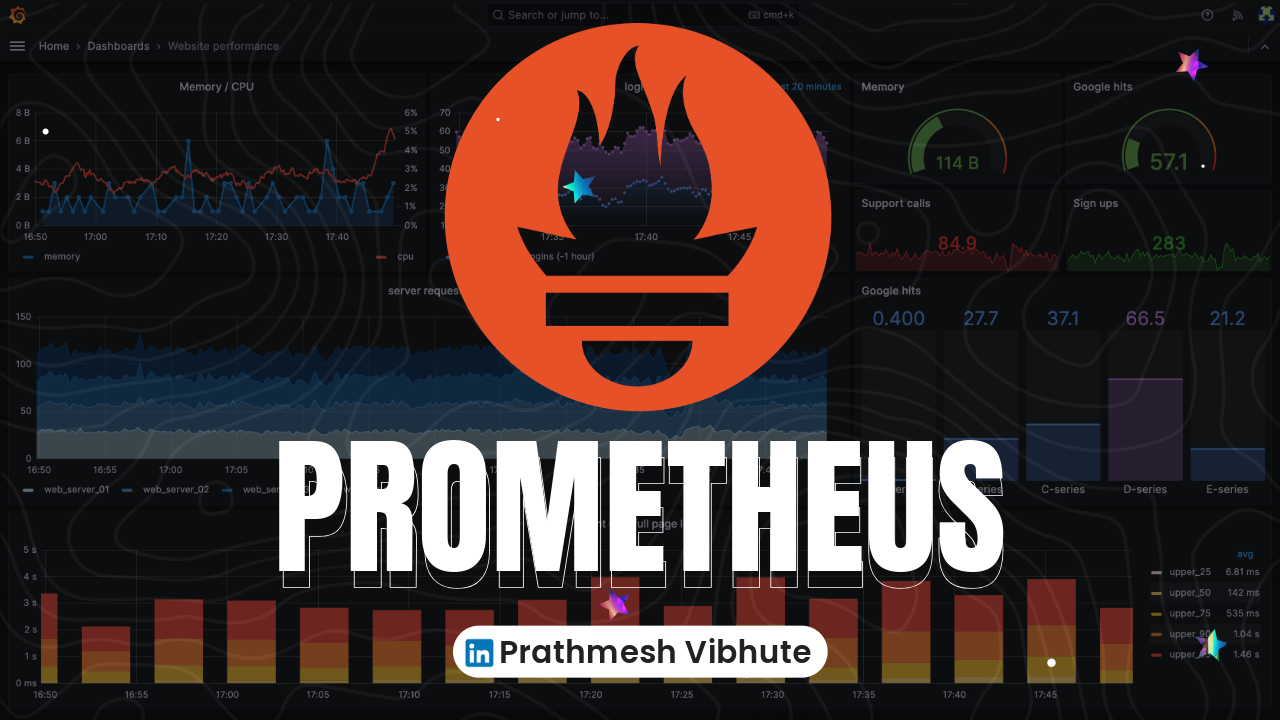Day 79 : Prometheus
 Prathmesh Vibhute
Prathmesh Vibhute
In today's rapidly evolving tech landscape, maintaining the health and performance of your applications and infrastructure is critical. Enter Prometheus, an open-source monitoring system and alerting toolkit designed to help you keep your services running smoothly. Prometheus excels in collecting and storing metrics as time series data, identified by metric names and timestamps. Let's dive deeper into what makes Prometheus an indispensable tool for monitoring modern systems.
Architecture of Prometheus Monitoring
Prometheus employs a robust, modular architecture designed to handle large-scale monitoring:
Prometheus Server: The core component that scrapes and stores metrics data from various targets.
Client Libraries: Used by applications to expose metrics in a Prometheus-compatible format.
Exporters: Components that help expose metrics from third-party systems as Prometheus metrics.
Pushgateway: Facilitates metrics collection from short-lived jobs.
Alertmanager: Manages alerts generated by Prometheus queries.
Web UI: Allows users to visualize metrics data and configure monitoring tasks.
The Prometheus server scrapes metrics data from configured targets at specified intervals, storing this data locally. This design ensures high reliability and makes Prometheus resilient to outages since each server operates independently.
Features of Prometheus
Prometheus offers a rich set of features that make it a standout in the monitoring landscape:
Multi-dimensional Data Model: Uses key-value pairs to identify metrics.
Flexible Query Language (PromQL): Allows for powerful querying and real-time data analysis.
Time Series Storage: Optimized for efficiency and high performance.
Service Discovery: Dynamically discovers targets using various mechanisms such as Kubernetes, Consul, etc.
Alerting: Supports a robust alerting mechanism through the Alertmanager.
Visualization: Integrated with tools like Grafana for advanced visualization capabilities.
Components of Prometheus
Prometheus comprises several key components that work together to provide comprehensive monitoring:
Prometheus Server: Collects and stores time series data.
Service Discovery: Automatically discovers services to monitor.
Scrape Configuration: Defines how and when to scrape targets.
PromQL: The query language used to query and aggregate metrics.
Alertmanager: Handles alerts, deduplicating, grouping, and routing them to various receivers like email, Slack, or custom webhooks.
Pushgateway: Allows ephemeral and batch jobs to expose their metrics to Prometheus.
Exporters: Help in exporting existing metrics from third-party services (e.g., Node Exporter for Linux system metrics).
Database Used by Prometheus
Prometheus uses its own custom time series database for storing metrics. This database is optimized for high performance and efficiency in handling time series data. It is designed to provide fast storage and retrieval of metrics with a focus on minimal resource consumption.
Default Data Retention Period in Prometheus
By default, Prometheus retains data for 15 days. This retention period is configurable based on your needs and available storage capacity. Adjusting the retention period can help balance the trade-off between storage costs and the amount of historical data available for analysis.
Conclusion
Prometheus stands out as a powerful and versatile tool for monitoring and alerting in modern infrastructure. Its flexible architecture, rich feature set, and efficient time series database make it an ideal choice for organizations of all sizes. Whether you're running microservices, managing a complex infrastructure, or just looking to keep an eye on a few critical applications, Prometheus has the tools you need to ensure everything runs smoothly. As you explore Prometheus, you'll find it to be an indispensable ally in maintaining the health and performance of your services.
I'm confident that this article will prove to be valuable, helping you discover new insights and learn something enriching .
thank you : )
Subscribe to my newsletter
Read articles from Prathmesh Vibhute directly inside your inbox. Subscribe to the newsletter, and don't miss out.
Written by
